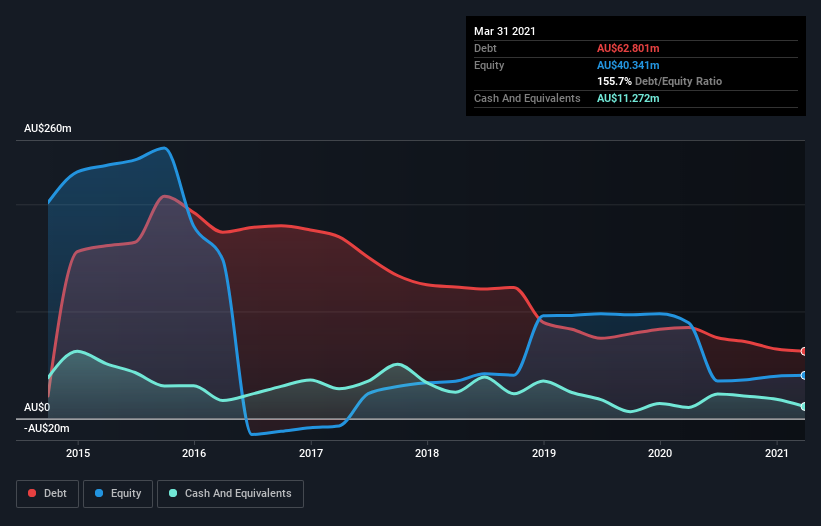
Legendary fund manager Li Lu (who Charlie Munger backed) once said, 'The biggest investment risk is not the volatility of prices, but whether you will suffer a permanent loss of capital.' So it seems the smart money knows that debt - which is usually involved in bankruptcies - is a very important factor, when you assess how risky a company is. As with many other companies AusGroup Limited (SGX:5GJ) makes use of debt. But should shareholders be worried about its use of debt?
When Is Debt Dangerous?
Debt assists a business until the business has trouble paying it off, either with new capital or with free cash flow. If things get really bad, the lenders can take control of the business. However, a more usual (but still expensive) situation is where a company must dilute shareholders at a cheap share price simply to get debt under control. Of course, the upside of debt is that it often represents cheap capital, especially when it replaces dilution in a company with the ability to reinvest at high rates of return. The first step when considering a company's debt levels is to consider its cash and debt together.
See our latest analysis for AusGroup
What Is AusGroup's Net Debt?
You can click the graphic below for the historical numbers, but it shows that AusGroup had AU$62.8m of debt in March 2021, down from AU$85.0m, one year before. On the flip side, it has AU$11.3m in cash leading to net debt of about AU$51.5m.

How Healthy Is AusGroup's Balance Sheet?
We can see from the most recent balance sheet that AusGroup had liabilities of AU$33.0m falling due within a year, and liabilities of AU$75.8m due beyond that. Offsetting these obligations, it had cash of AU$11.3m as well as receivables valued at AU$49.9m due within 12 months. So its liabilities total AU$47.7m more than the combination of its cash and short-term receivables.
This deficit is considerable relative to its market capitalization of AU$68.4m, so it does suggest shareholders should keep an eye on AusGroup's use of debt. Should its lenders demand that it shore up the balance sheet, shareholders would likely face severe dilution. The balance sheet is clearly the area to focus on when you are analysing debt. But it is AusGroup's earnings that will influence how the balance sheet holds up in the future. So when considering debt, it's definitely worth looking at the earnings trend. Click here for an interactive snapshot.
Over 12 months, AusGroup made a loss at the EBIT level, and saw its revenue drop to AU$176m, which is a fall of 41%. That makes us nervous, to say the least.
Caveat Emptor
Not only did AusGroup's revenue slip over the last twelve months, but it also produced negative earnings before interest and tax (EBIT). Indeed, it lost a very considerable AU$8.4m at the EBIT level. When we look at that and recall the liabilities on its balance sheet, relative to cash, it seems unwise to us for the company to have any debt. Quite frankly we think the balance sheet is far from match-fit, although it could be improved with time. We would feel better if it turned its trailing twelve month loss of AU$60m into a profit. So in short it's a really risky stock. There's no doubt that we learn most about debt from the balance sheet. But ultimately, every company can contain risks that exist outside of the balance sheet. To that end, you should be aware of the 2 warning signs we've spotted with AusGroup .
When all is said and done, sometimes its easier to focus on companies that don't even need debt. Readers can access a list of growth stocks with zero net debt 100% free, right now.
If you’re looking to trade AusGroup, open an account with the lowest-cost* platform trusted by professionals, Interactive Brokers. Their clients from over 200 countries and territories trade stocks, options, futures, forex, bonds and funds worldwide from a single integrated account. Promoted
New: Manage All Your Stock Portfolios in One Place
We've created the ultimate portfolio companion for stock investors, and it's free.
• Connect an unlimited number of Portfolios and see your total in one currency
• Be alerted to new Warning Signs or Risks via email or mobile
• Track the Fair Value of your stocks
This article by Simply Wall St is general in nature. We provide commentary based on historical data and analyst forecasts only using an unbiased methodology and our articles are not intended to be financial advice. It does not constitute a recommendation to buy or sell any stock, and does not take account of your objectives, or your financial situation. We aim to bring you long-term focused analysis driven by fundamental data. Note that our analysis may not factor in the latest price-sensitive company announcements or qualitative material. Simply Wall St has no position in any stocks mentioned.
*Interactive Brokers Rated Lowest Cost Broker by StockBrokers.com Annual Online Review 2020
Have feedback on this article? Concerned about the content? Get in touch with us directly. Alternatively, email editorial-team (at) simplywallst.com.
About SGX:5GJ
AusGroup
AusGroup Limited, an investment holding company, engages in the provision of integrated service solutions to the energy, resources, industrial, utilities, and port and marine sectors in Australia and Southeast Asia.
Mediocre balance sheet and slightly overvalued.
Market Insights
Community Narratives



